-
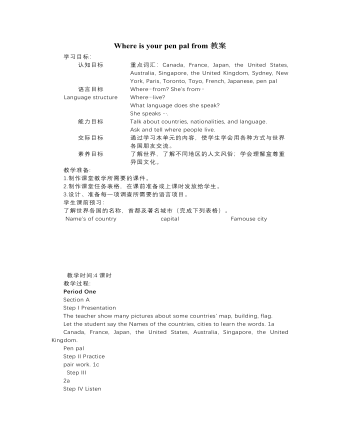
人教版新目标初中英语七年级下册Where is your pen pal from教案
2.1Match the country with the language.Step II Reading3a? let the students read the letter fast and answer the questions.? Let the students ask more questions about the letter as possible as the can.Step III Writing3b.Step IV. Pairwork2cStep V Listening2a, 2bStep V. HomeworkExercises book(1) P3Exercises book (2) P3Period FourStep I . Dictate the words and sentences in Unit1.Step II. Self-checkStep III. Check the answers for Exercises book in the unit.Step IV. Home workRevise and preparation for unit 2.教学反思:通过本单元的学习,学生基本可以谈论人们的国籍,居住城市及其所说的语言,通过书信方式去介绍自己并寻找笔友。但在涉及到国外的一些城市时,学生对这方面的知识相对欠缺,能介绍的城市并不多,也反应出学生课前预习不充分,这跟学生学习条件也有关,大多数学生无法通过网络获取所需信息。因此,在以后的教学中要多指导学生通过计算机网络获取信息,拓宽知识面。
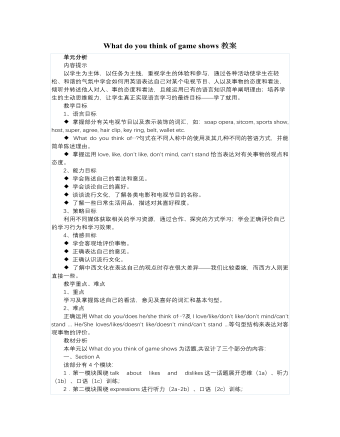
人教版新目标初中英语七年级下册What do you think of game shows教案
五、教学Section B-2c1. Pair work: What do you think of the belt/sunglasses/…? What does your father/mother/… think of your scarf/belt…?2. Group work(1). Teacher shows some different kinds of school uniforms (制服)and asks : “ What do you think of your school uniforms? If you have a chance to choose your school uniforms, what kind would you like to choose?”(2). Discuss in groups.(3).Get some Ss to report in class.说明:这一步旨在让学生运用已有的语言知识谈论对事物的看法和意见,并简单阐明理由,培养学生的主动思维能力和运用英语的能力。六、教学拓展调查电视节目的收视率任务:调查你周围的人对现在各种电视节目的反响。活动过程:1.教师布置任务,让学生调查周围的人(包括他的亲戚朋友和邻居)喜欢收看哪方面的电视节目。2.学生进行调查活动,运用本单元所学的句型What do you think of….? (Why?)What's your favorite game shows?What do you think of talk show?I doesn’t mind it.I like it.I love it.I can’t stand it.3.记录下排在前10位的TV Program,填写调查表,比较其收视率。
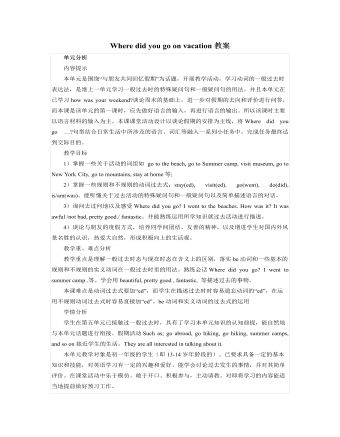
人教版新目标初中英语七年级下册Where did you go on vacation教案
句型: Where did you go on vacation? I went to summer camp.Did she go to Central Park?Yes,she did.No, she didn’t语法:一般过去时特殊疑问句、一般疑问句及肯、否定回答。课时安排4课时第一课时:Section A:la,1b,lc,2a,2b,2c 第二课时:Section A:3a,3b,4第三课时:Section B:1,2a,2b,2c第四课时:Section B:3a,3b,3c,4 and Self Check第一课时教学目标掌握描写假期生活的形容词。假期里自己所做事情的简单表达。谈论假期做的事情及当时情况。谈论假期时旅游的天气,旅游者以及食物等。教学过程一、导入播放一首英文歌曲:Let’s travel 说明:通过让学生听节奏欢快迪斯尼英语歌曲Let’s travel.引入本节课谈论的话题vacation and travel. 让歌曲使学生的思维活跃,增强课堂气氛,激发学生提高学习英语的兴趣。T:How is the trip ?Ss : It’s pretty good/ happy/exciting /relaxing/busy/dangerous/ fantastic说明:这个问题是为了操练形容词。建议让多个Ss作答。鼓励他们用不同的形容词。上述个别形容词本应在第二课时中出现,但可以在warming-up中第一次非正式出现。这些形容词也可在老师的评价语中适时出现,以加深学生对词汇的印象。
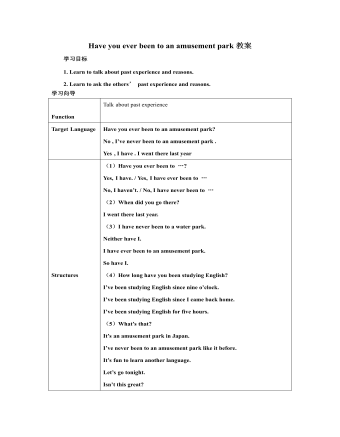
人教版新目标初中英语八年级下册Have you ever been to an amusement park教案
(1)Have you ever been to …? Yes, I have. / Yes, I have ever been to …No, I haven’t. / No, I have never been to …(2)When did you go there? I went there last year. (3)I have never been to a water park. Neither have I. I have ever been to an amusement park. So have I. (4)How long have you been studying English? I’ve been studying English since nine o’clock. I’ve been studying English since I came back home. I’ve been studying English for five hours. (5)What’s that? It’s an amusement park in Japan. I’ve never been to an amusement park like it before. It’s fun to learn another language. Let’s go tonight. Isn’t this great?space museum, amusement park, water park, South America, Peru, Holland, European culture, tour guide, flight attendant, musical instrument, more than, be from, get to, take lessons, neither, discover, graduate, change

人教版新目标初中英语八年级下册It’s a nice day, isn’t it教案2篇
"Hello! Welcome to English class! Introduce yourself. Meet your new classmates." That's what the teacher says. What do you say? "Oh no!" It can be difficult talking to new people. But it can be fun, and you can make friends. How do you do it? Make small talk. Small talk is polite conversation. "Wang Nan is a great pingpang player, isn't she?" "I'd love to meet her, wouldn't you?" "It's been raining a lot, hasn't it?" Tag questions are a form of polite speech. To make small talk successfully, you should know how to make them. You should also know what topics to talk about. Try to learn this unit carefully. The next time you're in English class, you'll find out. Making small talk's easy, isn't it? (“你好!欢迎你!请做一下自我介绍。认识一下你的新同学。”通常在课上老师会这样说。你会说什么呢?“噢,不!”与陌生人谈话太困难了。但是这也很有意思,并且你还能交到朋友。你该怎么做呢?闲聊。闲聊指得是礼貌的对话。“王楠是一个很棒的乒乓球运动员,不是吗?”“我希望自己能认识她,你呢?“今年的雨水很多,不是吗?”反意疑问句是一种礼貌用语。为了使得谈话成功,你应该知道怎样去进行闲聊。你还应该知道与不同的人该谈论什么样的话题。认真的学习这个单元吧,下次在英语课上,你会发现与大家展开谈话是一件很容易的事情,不信我们来试试。)

人教版新目标初中英语八年级下册He said I was hard-working教案2篇
This activity introduces some new vocabulary and provide oral practice using the target language.Task 1 . Ask four students to stand in front of the class, and the teacher asks them the following questions as a reporter.1.What are you going to do when you grow up?2.What are you going to do next week?3.What are going to do after school?The students will give different answers, then ask a good student to report what they said.I am going to e a doctor.What did she say?----------She said she was going to be a doctor.I am going to have a party on Friday night.What did he say?-------He said he was going to have a party on Friday night.I am going to do my homework.What did she say ?------ She said she was going to do her homework.I am going home after school.What did she say?-----She said she was going home after school.Say In this unit we are going to learn to use words like to report what someone said.Task 2. Read the instructions. Then ask a student to read the four questions. And write the words on the Bb. Explain what soap opera is.Task 3. Ask the students to Look at the pictures, point out the TV screens in the picture. Ask one girl to read what Marcia said.What did Marcia say? She said She said she was having a surprise party for Lana on Friday night. Repeat the other pictures in the same way.Activity3. Listen and number the pictures in activity 1a.
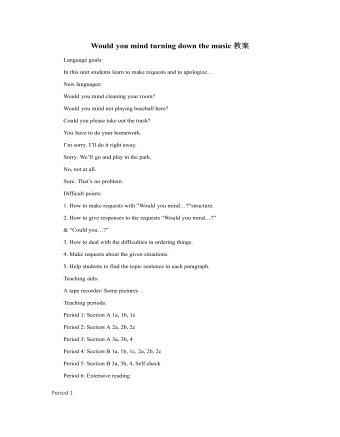
人教版新目标初中英语八年级下册Would you mind turning down the music教案
Step 4. Group work (4)1. Ask a pair of students to read the dialogue. Say, This activity provides speaking, listening and writing practice using the target language.2. Ask students to complete the work in groups.3. Check the answers with the whole class. 4. Explain some of the language points. Step 5. Word review (Self check 1)1. Ask students to read the words and the phrases given. 2. Fill in the blanks with proper forms of these words to complete the sentences. 3. Check the answers with the whole class. Homework:Do activity 2 on page 57 after class. Period 6Teaching aims: 1. Teach vocabulary words and the useful expressions. 2. Enable the students to learn etiquette in different culture. 3. Help the students learn how to behave politely in public places and in daily life. Teaching procedures:Step 1. RevisionHelp students to review the function of making requests through a free talk. Then lead them to the topic of etiquette. Explain the meaning of etiquette. Or, ask students to look it up in the dictionary. Step 2. Pre-reading (Section 1)1. Ask students to read the picture and make a list with their partner about how many rules of etiquette can be seen being broken.

人教版新目标初中英语九年级下册By the time I got outside, the bus had already left教案
Ⅰ. Teaching Aims and Demands1. Knowledge Objects(1) Key Vocabularyoversleep(2) Target LanguageWhat happened?I overslept. And by the time I got up, my brother had already gotten in the shower.2. Ability Objects(1) Teach the students to use the new words.(2) Train the students to narrate past events with the Past Perfect Tense.(3) Train the students' listening and speaking skills with the target language.3. Moral ObjectIt’s a good habit to go to bed early in the evening and get up early in the morning. So you’ll never be in a hurry in the morning.Ⅱ. Teaching Key Points1. Key Vocabularyoversleep2. Target LanguageNarrate past events with the Past Perfect TenseⅢ. Teaching Difficult Points1. Train the students to narrate past events with the Past Perfect Tense.2. Train the students to understand the target language in spoken conversation.Ⅳ. Teaching Methods1. Thinking of examples from the students' real lives.2. Making sentences by looking at the pictures.Ⅴ. Teaching AidA tape recorderⅥ. Teaching ProceduresStep I Revision1. Revise the language points in Unit 8.Ask some questions like this: What volunteer work would you like to do?Help the students to answer, I’d like to…/I love to…/I hope to2. Practice the dialogue in Activity 3c on page 62 again. Get students to role play the similar dialogues with the following.

人教版新目标初中英语九年级下册Rainy days make me sad教案
1. 教材分析本单元以how do things affect you?为话题, 从颜色、天气、音乐、广告、产品等方面谈论了外界事物如何影响人的心情。要求学生掌握表达某物或某事给人带来的感觉、看法或影响等。共设计了四个部分的内容:Section A 该部分有4个模块:第一模块围绕Which restaurant would you like to go to?这一话题展开思维(1a)、听力(1b)、口语(1c)训练;第二模块围绕How does music affect you? 进行听力(2a-2b)、口语训练(2c);第三模块继续围绕how do colors in the restaurant affect you这一话题展开训练,训练形式为阅读和问题体验(3a)和小组活动(3b);第四模块仍就How do things affect you这一话题以调查的形式展开讨论。Section B该部分有4个模块:第一模块围绕产品广告对人们的影响这一话题以“配对”(1a)与“列举”(1b)两种形式展开训练;第二模块继续围绕How do things affect you? 进行听力(2a-2b)、口语对话训练(2c);第三模块围绕“Advertising”这一话题展开阅读(3a-3b)和写作(3c)训练;第四模块围绕How posters affect you这一话题以口语训练形式展开小组活动。

人教版新目标初中英语九年级下册I’ll help clean up the city parks教案
Talk about offering help (P60)I’ll help clean up the city parks.A: I’d like to work ...B: You could help ...Talk about ways to tell people about the Clean-Up Day (P61)We need to ...We can’t ...I’ll ...Talk about the work the volunteers do (P62)These three students all volunteer their time to help other people.Somebody loves to ... / helps ... / plans to ... / wants to ...A: What do you like doing?B: I like ... A: What kind of volunteer work do you think I could do?B: You could ...1. 重点词汇advertisement, fix, repair, pleasure, blind, deaf, shut, carry, specially, fetch2. 认读词汇hunger, homeless, cheer, clean-up, sign, establish, major, commitment, elementary, veterinarian, coach, similar, call-in, strategy, disabled, organization, unable, support, appreciate, donation, part of speech, pronoun, adverb, preposition, conjunction, donate, Jimmy, Sally3. 词组clean up, cheer up, give out, put off, set up, think up, take after, fix up, give away, put up, hand out, work out, at once

人教版新目标初中英语九年级下册We’re trying to save the manatees教案2篇
本单元主要围绕着有关濒临灭绝的动物这一话题,学习了应该怎样保护我们的环境,以及就某一问题展开辩论。目标提示语言目标能够运用所学知识,就某一问题展开辩论。认知目标1、复习一些语法:现在进行时、一般现在时、用used to 表示一般过去时、现在完成时、一般过去时的被动语态。2、学会表达同意和不同意。3、学会以下基本句型:We’re trying to save the manatees.Manatees eat about 100 pounds of food a day.There used to be a lot of manatees.In 1972,it was discovered that they were endangered.Some of the swamps have become polluted.情感目标了解一些濒临灭绝的动物的生活习性和濒临灭绝的原因,教育学生应该如何保护环境。教学提示充分利用多媒体等教学设备,创设与本课话题相关的情境,如各种不同种类的动物、动物园以及有关环境的画画等等。围绕着本单元的教学目标,设计一些贴近学生实际的教学任务,如让学生谈论自己最喜欢的动物,如何拯救濒危动物,如何保护环境等等。让学生根据所学知识,就动物园是否对动物有利以及其他的话题进行辩论。
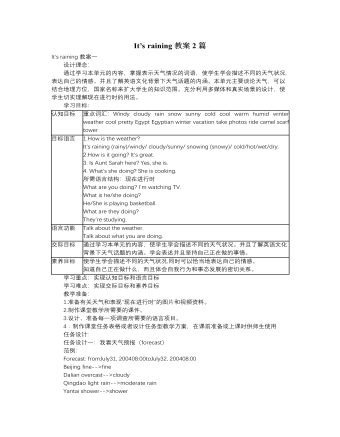
人教版新目标初中英语七年级下册It’s raining教案2篇
1 Each group choose one place to describe and what you are doing in it Choose one place, and describe what they are doing 2 Move around the room and give suggestions Talk about it and write it down 3 Ask one to show their works and act it Choose one of each group to make a report 4 Evaluate the best group and the best reporter Choose the best one Homework Ask your friends their ideal place and write about it教学反思:新课程标准中强调学生在课堂中的主体地位,在综合课中他们的主体地位就更加突出。在各个活动中给不同程度的学生不同层次的任务,让各层面的学生都有表现发挥的机会,从而产生对英语的兴趣。使用照片图片多媒体来辅助教学,效果更好。同时让了解其他国家风景,风俗的同学介绍ideal place,增加学生的背景知知识,实现跨学科交流的目的。教案点评:采用任务型教学模式,在各个活动中给不同程度的学生不同层次的任务,让各层面的学生都有表现发挥的机会,从而产生对英语的兴趣。使用照片图片多媒体来辅助教学,效果更好。让了解其他国家风景,风俗的同学介绍ideal place,增加学生的背景知识,实现跨学科交流的目的。

人教版新目标初中英语九年级下册Could you please tell me where the restrooms are教案
Step Ⅰ RevisionCheck homework. Ask a few students to read the article in 3a.Then ask a few students to read their guides.Step Ⅱ Part 1Look at the words in the box. Ask a student to read them. Make sure the students understand the meaning of the words. You are to fill in the blanks with the words. In some cases, students may need to use another form of the word, for example adjusting for tense or subject/ verb agreement.Ask students to fill in the blanks on their own.Check the answers. Step ⅢPart 2Go through the instructions with the class.Look at the example with the students.Ask students what the answer would be.Ask a student to read the question and answer it.Excuse me, could you tell me where the bank is, please?The bank is across the street from the shopping malt.Get students to complete the work in pairs.Check the answers. Ask a few students to read their questions.Step Ⅳ Just for Fun!Ask all the students to read the conversation. Ask: What is funny about this cartoon? Help students to explain. A Martian is a person from the planet Mars.There is no such thing as Martian food on Earth, and the clerk looks silly because he is trying to think of where there is a Martian restaurant.Invite some pairs of students to present this conversation to the rest of the class.Step Ⅴ Summary and HomeworkIn this class, we’ve done much writing practice using the key vocabulary words and the target language presented in this unit. After class, please finish the questions in 2 in your exercise books. Then finish the exercises on pages 47~48 of the workbook as well.The Seventh Period Ⅰ Teaching Aims and Demands1. Knowledge Objects(1) Key Vocabularyimage, adventure, jealousy, hero, crime, journey, brave, no longer, show interest in, take it easy, become interested in, plain looks(2)Text:Grown-ups like cartoons, too.2. Ability Objects(1) Fast-reading to get a general idea of the text.(2) Careful-reading to get the detailed information in the text.

初中历史与社会人教版九年级下册《地球一小时 活动》教材教案
地球一小时(Earth Hour)是世界自然基金会(WWF)应对全球气候变化所提出的一项倡议,希望家庭及商界用户关上不必要的电灯及耗电产品一小时。来表明他们对应对气候变化行动的支持。过量二氧化碳排放导致的气候变化目前已经极大地威胁到地球上人类的生存。公众只有通过改变全球民众对于二氧化碳排放的态度,才能减轻这一威胁对世界造成的影响。地球一小时在3月的最后一个星期六20:30~21:30期间熄灯。活动由来:“地球1小时”也称“关灯一小时”,是世界自然基金会在2007年向全球发出的一项倡议:呼吁个人、社区、企业和政府在每年三月最后一个星期六20:30~21:30期间熄灯1小时,以此来激发人们对保护地球的责任感,以及对气候变化等环境问题的思考,表明对全球共同抵御气候变暖行动的支持。这是一项全球性的活动,世界自然基金会于2007年首次在悉尼倡导之后,以惊人的速度席卷全球,大家都来参加这个活动。[1] “地球1小时”活动首次于2007年3月31日在澳大利亚的悉尼展开,一下子吸引了超过220万悉尼家庭和企业参加;随后,该活动以惊人的速度迅速席卷全球。在2008年,WWF(中国)对外联络处透露,全球已经有超过80个国家、大约1000座城市加入活动。2013年,包括悉尼歌剧院、帝国大厦、东京塔、迪拜塔、白金汉宫在内的各国标志性建筑也在当地时间晚八点半熄灯一小时。[2] ,其中包括巴勒斯坦、法属圭亚那、加拉帕戈斯群岛、卢旺达、圣赫勒那岛、苏里南、突尼斯等首次参与“地球一小时”的国家和地区。在中国,北京鸟巢、水立方、世贸天阶等标志性建筑同时熄灯,同一时段,从上海东方明珠到武汉黄鹤楼,从台北101到香港天际100观景台,中国各地多个标志性建筑均熄灯一小时,全国共有127个城市加入“地球一小时”活动。
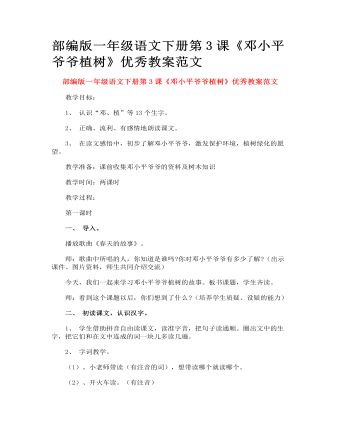
部编版一年级语文下册第3课《邓小平爷爷植树》优秀教案范文
读文感悟。 1、出示:邓小平爷爷( )地种柏树。 师:同学们带着这个问题仔细读课文,用“——”划出有关句子。然后想一想,“( )”里填什么词比较恰当。 2、生自由读课文,边读边划。 3、 全班汇报交流。 师:你认为邓小平爷爷( )地种柏树,从哪些地方体现出来? (以读为主,引导学生学会读课文,尊重学生个性化的理解。“( )”里可填“起劲、仔细、认真、一丝不苟、小心”等等,随机进行读文,结合语言文字训练,体会邓小平爷爷积极为祖国绿化作贡献的精神。) (如:找出邓小平爷爷种树的动作词“挖、挑选、移、填、站在、扶正”,同桌伙伴,一人做动作,一人口述植树过程。“移”字可换“放”字比较理解。) 4、 四人小组讨论:邓小平爷爷为什么种树?他是怎么想的? (结合课前收集的邓小平爷爷的资料理解,体会邓小平爷爷一心为国之心,激发学生参与绿化的热情。)
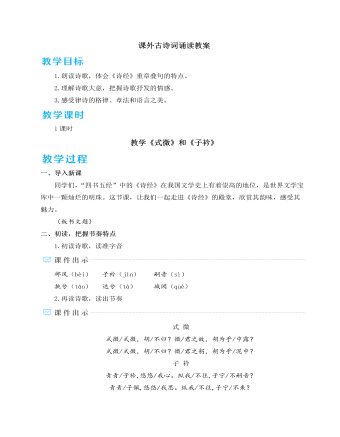
人教部编版语文八年级下册课外古诗词诵读教案
预设 “海内存知己,天涯若比邻”一反送别诗伤感悲戚的格调,体现出高远的志趣和旷达的胸怀,表明诚挚的友谊可以超越时空。此句蕴含哲理,给人以莫大的安慰和鼓舞,因此成为远隔千里的朋友间表达深情厚谊的名句。设问3:“气蒸云梦泽,波撼岳阳城”中的“蒸”和“撼”换成“滋”和“摇”好不好?为什么?预设 不好。“蒸”是蒸腾的意思,形象地描绘了洞庭湖雾气蒸腾、湖面浩渺的画面;“撼”是摇撼的意思,描绘出了洞庭湖波涛汹涌似要撼动岳阳城的雄伟壮阔的景象,且“撼”还能传达出诗人面对湖水时心胸似乎也被震荡,从而想要建功立业的主观感受。如果换成“滋”和“摇”则显得境界小、力度弱,没有这样的气势和表达效果。【设计意图】此环节主要采用问题引领的方式,一步步引导学生品味诗歌中的名句和富有表现力的字词,感受古人炼字的智慧,从而更加深入地理解诗歌情感和艺术手法。
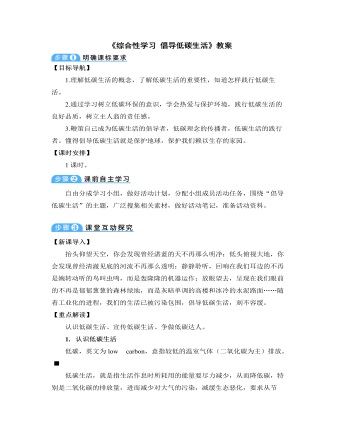
部编版语文八年级下册《综合性学习:倡导低碳生活》教案
【新课导入】抬头仰望天空,你会发现曾经湛蓝的天不再那么明净;低头俯视大地,你会发现曾经清澈见底的河流不再那么透明;静静聆听,回响在我们耳边的不再是婉转动听的鸟叫虫鸣,而是轰隆隆的机器运作;放眼望去,呈现在我们眼前的不再是郁郁葱葱的森林绿地,而是灰暗单调的高楼和冰冷的水泥路面……随着工业化的进程,我们的生活已被污染包围,倡导低碳生活,刻不容缓。【重点解读】认识低碳生活、宣传低碳生活、争做低碳达人。1. 认识低碳生活低碳,英文为low carbon,意指较低的温室气体(二氧化碳为主)排放。低碳生活,就是指生活作息时所耗用的能量要尽力减少,从而降低碳,特别是二氧化碳的排放量,进而减少对大气的污染,减缓生态恶化,要求从节水、节电、节气和回收四个环节来改变生活细节。
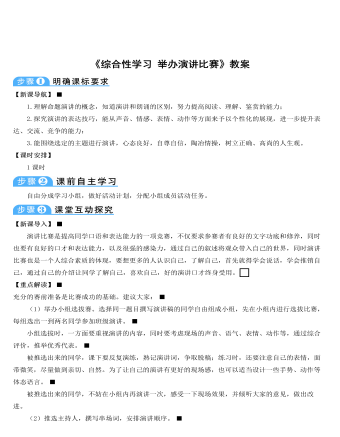
部编版语文八年级下册《综合性学习:举办演讲比赛》教案
【新课导入】演讲比赛是提高同学口语和表达能力的一项竞赛,不仅要求参赛者有良好的文字功底和修养,同时也要有良好的口才和表达能力,以及很强的感染力,通过自己的叙述将观众带入自己的世界,同时演讲比赛也是一个人综合素质的体现,要想更多的人认识自己,了解自己,首先就得学会说话,学会推销自己,通过自己的介绍让同学了解自己,喜欢自己,好的演讲口才终身受用。【重点解读】充分的赛前准备是比赛成功的基础。建议大家:(1)举办小组选拔赛。选择同一题目撰写演讲稿的同学自由组成小组,先在小组内进行选拔比赛,每组选出一到两名同学参加班级演讲。小组选拔时,一方面要重视演讲的内容,同时要考虑现场的声音、语气、表情、动作等,通过综合评价,推举优秀代表。
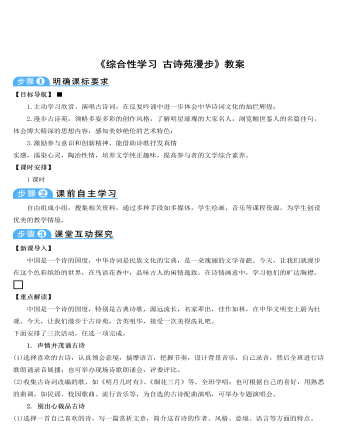
部编版语文八年级下册《综合性学习:古诗苑漫步》教案
【目标导航】1.主动学习欣赏、演唱古诗词,在反复吟诵中进一步体会中华诗词文化的灿烂辉煌;2.漫步古诗苑,领略多姿多彩的创作风格,了解明星璀璨的大家名人,浏览醒世鉴人的名篇佳句,体会博大精深的思想内容,感知美妙绝伦的艺术特色;3.激励参与意识和创新精神,能借助诗歌抒发真情实感,濡染心灵,陶冶性情,培养文学纯正趣味,提高参与者的文学综合素养。【课时安排】1课时自由组成小组,搜集相关资料,通过多种手段如多媒体,学生绘画,音乐等课程资源,为学生创设优美的教学情境。【新课导入】中国是一个诗的国度,中华诗词是民族文化的宝典,是一朵瑰丽的文学奇葩。今天,让我们就漫步在这个色彩缤纷的世界,在鸟语花香中,品味古人的闲情逸致,在诗情画意中,学习他们的旷达胸襟。
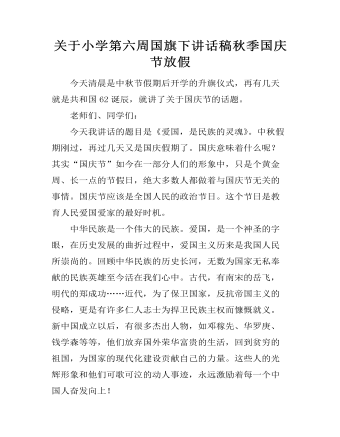
关于小学第六周国旗下讲话稿秋季国庆节放假
今天清晨是中秋节假期后开学的升旗仪式,再有几天就是共和国62诞辰,就讲了关于国庆节的话题。老师们、同学们:今天我讲话的题目是《爱国,是民族的灵魂》。中秋假期刚过,再过几天又是国庆假期了。国庆意味着什么呢?其实“国庆节”如今在一部分人们的形象中,只是个黄金周、长一点的节假日,绝大多数人都做着与国庆节无关的事情。国庆节应该是全国人民的政治节日。这个节日是教育人民爱国爱家的最好时机。中华民族是一个伟大的民族。爱国,是一个神圣的字眼,在历史发展的曲折过程中,爱国主义历来是我国人民所崇尚的。回顾中华民族的历史长河,无数为国家无私奉献的民族英雄至今活在我们心中。古代,有南宋的岳飞,明代的郑成功……近代,为了保卫国家,反抗帝国主义的侵略,更是有许多仁人志士为捍卫民族主权而慷慨就义。新中国成立以后,有很多杰出人物,如邓稼先、华罗庚、钱学森等等,他们放弃国外荣华富贵的生活,回到贫穷的祖国,为国家的现代化建设贡献自己的力量。这些人的光辉形象和他们可歌可泣的动人事迹,永远激励着每一个中国人奋发向上!


